First proposed in 2005, by 2021 it was official policy to levy a fee for rubbish disposal. Despite HK$177 million invested in mass advertising and trash bag production, both consumers and businesses remain uninterested. The project has been paused for the third time. No date is set for reimplementation. Liu Yifan reports from Hong Kong.
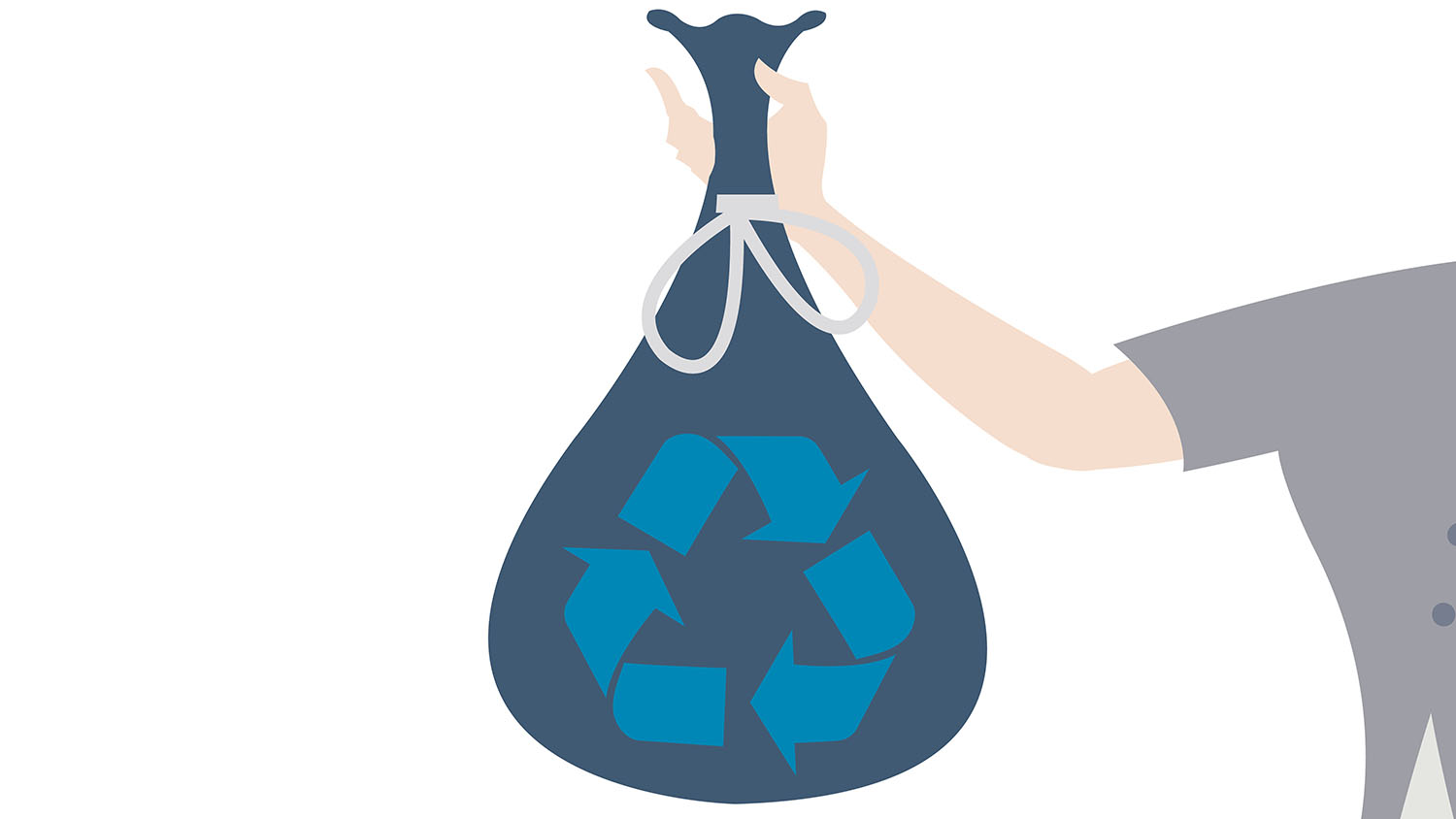
Hong Kong’s three landfills are near saturation at a daily dump of 15,725 metric tons of garbage. Of this trash, 71 percent, or 11,128 tons, is classified as municipal solid waste (MSW). MSW comprises 30 percent food, 21 percent plastic, and 20 percent paper waste. By incentivizing businesses and consumers to dump less and recycle more, the city hopes to create a circular green economy with new jobs and services and also to reduce carbon emissions.
READ MORE: Hong Kong's 'pay-as-you-throw' waste disposal put on hold
The matrix of polluter charges, subsidies, tax breaks, and incentives was designed to achieve these objectives at minimal social cost, within a sustainable, integrated, waste handling ecosystem. The program flopped yet again, largely due to inept public communication and a narrow departmental approach, instead of a whole-government engagement with residents and businesses.
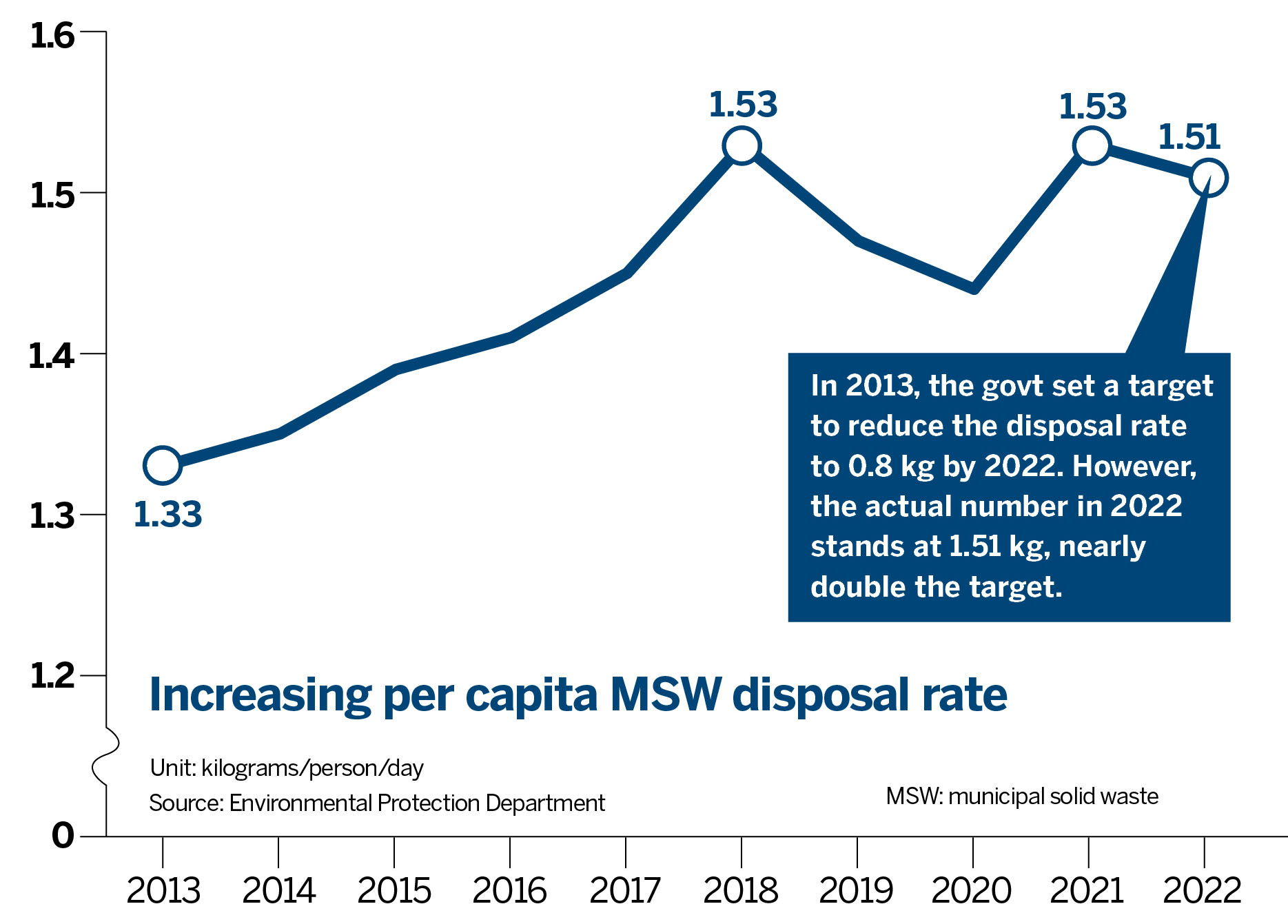
Cost burden
Households were required to pay 11 Hong Kong cents (1.4 US cents) per liter for waste from August. They must buy the designated trash bags or be fined HK$1,500 ($192). Catering businesses and care homes in an already stressed economy, resisted the recurrent costs of the specified disposal bags for food waste, diapers and medical disposables.
Distressed by the increased cost of living, as many as 80 percent of residents opposed the full implementation of the program by August, in a government survey earlier this year. Winston Yeung, chair of the Hong Kong Federation of Restaurants & Related Trades, estimates a 2,000-square-foot (185.8-square-meter) restaurant would incur HK$8,000 to $10,000 more per month for the designated bags. A large food chain with over 100 outlets could carry an additional burden of HK$1 million per month.
Environmental Protection Department (EPD) data show that HK$177 million went to promoting the program during the previous three fiscal years, of which about HK$121 million was for mass advertising and manufacturing the designated rubbish bags in 2023-24. HK$581 million was allocated for the current year. The EPD anticipated revenue of HK$1.79 billion a year after the program’s implementation.
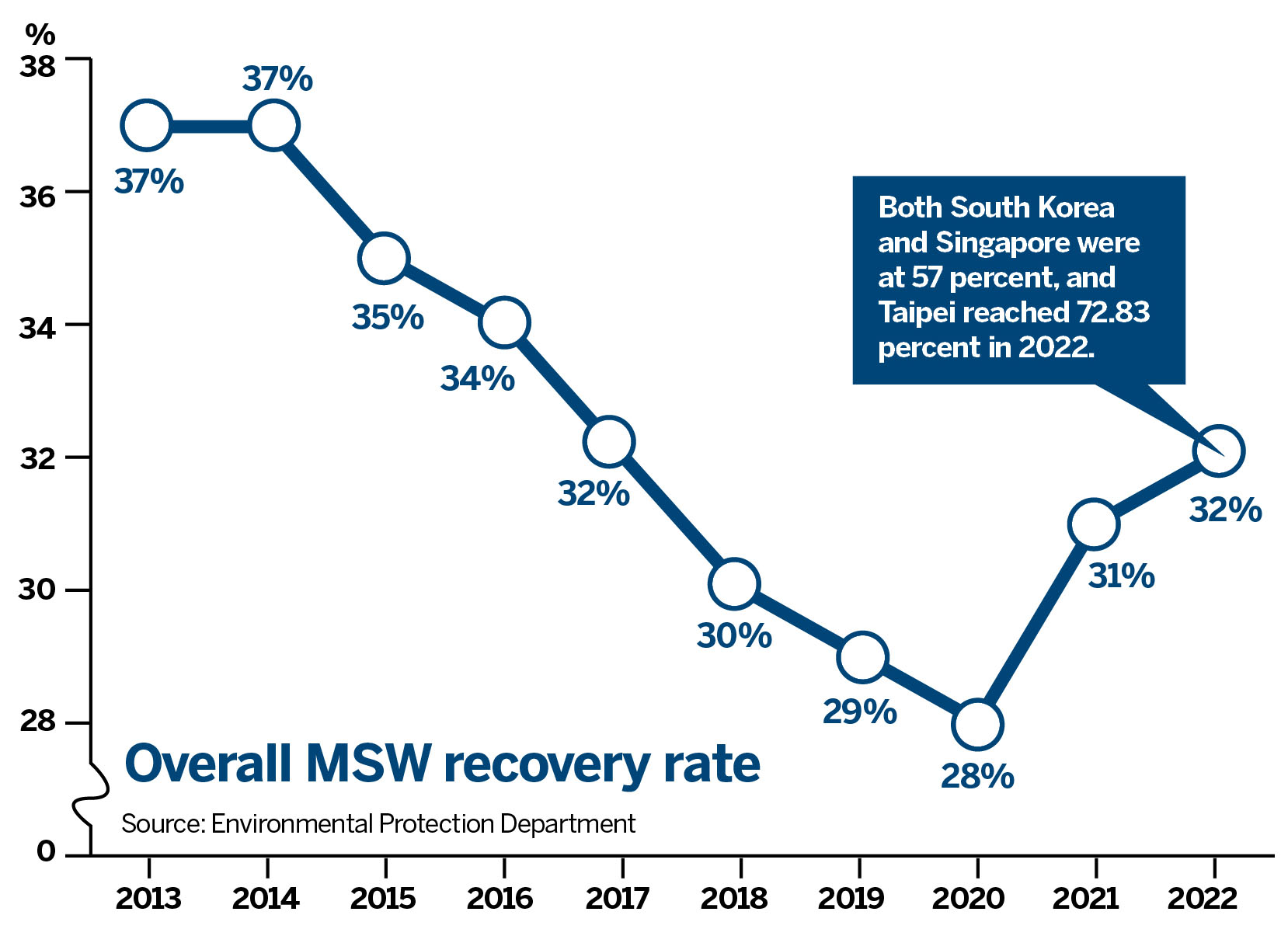
Low waste recovery
The Hong Kong Waste Reduction Website records the city’s MSW recovery rate in 2022 at 32 percent, which is relatively low. In the same year, waste recovery rates in South Korea and Singapore were 57 percent, and Taipei, Taiwan was at 72.83 percent.
Some 20 years ago, Seoul, South Korea, and the city of Taipei, implemented MSW programs with a combination of initiatives, including a disposal fee or tax to reduce MSW. Our Hong Kong Foundation (OHKF) researcher Peter Lam Kung-shing attributed their success to “sufficient public support”, which involved systematic and sustained preparation in both cities.
Taipei introduced the extended producer responsibility and recycling programs to encourage industrial waste management while also carrying out public education to raise residents’ awareness and acceptance of recycling. In Seoul, the early adoption of effective separation of recyclables reduced the demand for waste treatment facilities and increased public support for sustainable waste management.
The waste charging program was introduced in both cities using a phased implementation plan that moved from public debate to legislation, to formal introduction, and then to full adoption. “This phased approach enabled the local government to collect sufficient information and to revise and update the policy as required,” Lam said.
The polluter-pays principle is globally adopted, and the long-term economic benefits of waste charging are real. South Korea implemented the MSW charging program in 1995. The Korea Institute of Industrial Relations and Korea Environment Corporation data showed that in the first 10 years of implementation, the quantity of waste disposed reduced by 624,880 tons per year, while the amount of recycled waste increased by 321,565 tons per year. By 2019, the average daily volume of waste recycled increased to 403,350 tons in South Korea.
According to Lam, 1 ton of waste reduction generates a net benefit of HK$955.5, and 1 ton of waste recycling yields HK$125.6. In total, it is estimated that the net benefit of MSW charging is HK$637.3 million per year.
“The MSW bill is the least painful way of waste management for social costs,” said Lawrence Iu Chun-yip, executive director of Civic Exchange, adding that the program will serve as the foundation for a green economy. “This delay may be short-term relief from the economic burden for Hong Kong citizens, but in the future, we must bear a much higher cost that will really damage our city’s livability for a very long time.”
Meanwhile, the charging program could kick off with government properties first, said Johnnie Chan Chi-kau, CEO of Savills Services Group. “Why can’t the government take the lead?” asked Chan, citing the Government Property Agency — responsible for the management of all property owned by the government, such as the Chief Executive’s Office, police stations, fire stations, and government buildings. He said the city’s property management sector is ready with detailed guidance for building managers and owners, for the program’s rollout.
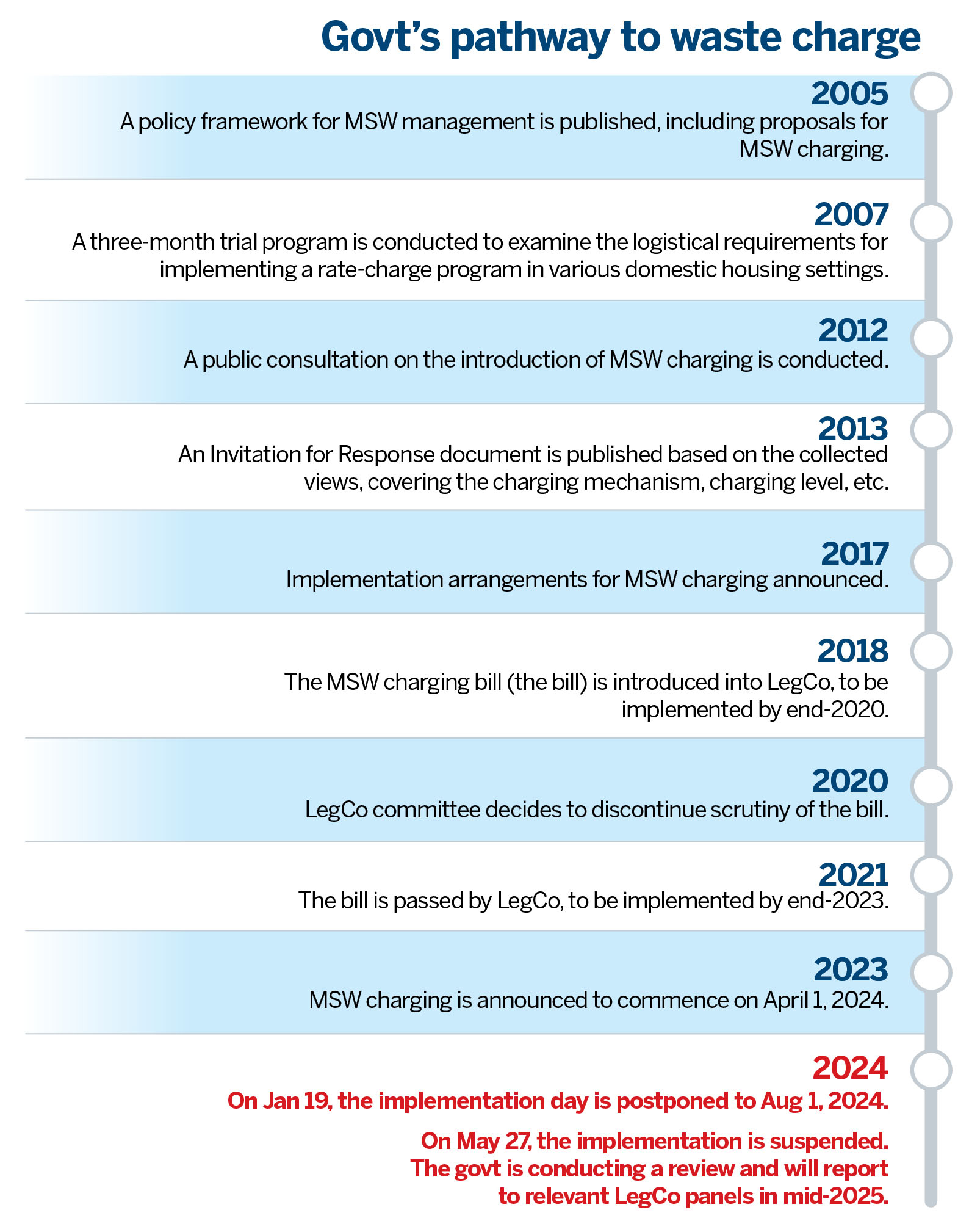
Incinerate waste, outsource
Lam cites investment in waste incinerators as an alternative to MSW charging, to transform waste into electricity. Hong Kong’s first waste incinerator, located on an artificial island off Shek Kwu Chau, is due to operate next year with a projected capacity of up to 3,000 tons of waste daily. But its output is paltry relative to the scale of waste generated daily. Another two incinerators are planned.
Another approach, Lam said, is to outsource the operations to the Guangdong-Hong Kong-Macao Greater Bay Area, given the city’s limited land supply and high labor costs. “It could involve sharing facilities and expertise across the 11 GBA cities to develop a more sustainable and efficient waste management system,” he added. Within the region, Foshan has achieved zero-landfill through incineration. In neighboring Shenzhen, there are five incinerators.
Hong Kong lawmaker Gary Zhang Xinyu said the government put too much promotion focus on the concrete operations of the plan, rather than its value. This approach implies that the program, which intends long-term social benefits, is a levy. The government should mobilize public participation by addressing concerns around the financial burden of the policy, and educate the community about the environmental benefits of waste reduction.
Savills Services Group’s Chan, who is also immediate past president of the Hong Kong Association of Property Management Companies, said that government officials should think from the perspective of the public, and revise their top-down public relations strategy. “The officials should anticipate the media response, and address the concerns of citizens, because ultimately they are the ones who need to pay extra,” said the property management veteran, who advised the government on the waste charging plan.
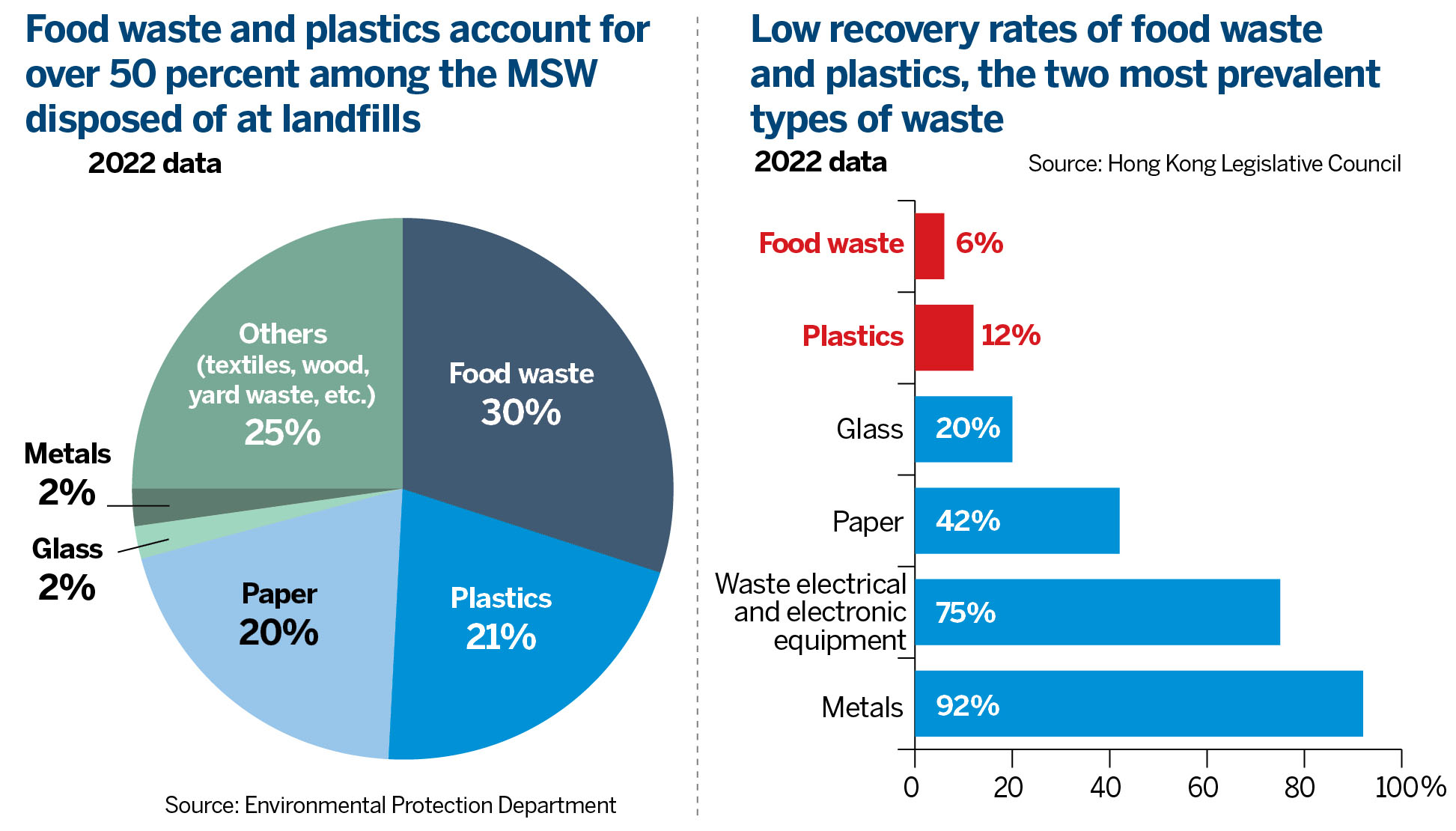
Gentle persuasion
What would be a good campaign? Former undersecretary for the environment Christine Loh Kung-wai’s answer is that it has to be “gentle”. “It’s like your auntie saying to you, ‘We need to do this for our own benefit. Let me help you.’ You must tell people until they are willing to do it,” she added.
A nicer way to deliver the message should also be coupled with more comprehensive civic education from a very young age. “It comes back to something very fundamental. The waste is ours,” said Loh, who is the chief development strategist of the Institute for the Environment at the Hong Kong University of Science and Technology (HKUST).
The government said it is working on multiple fronts for reintroduction of the charging program. In addition to enhancing recycling facilities, and stepping up public education and promotion, the government will also assess the readiness of society, and report work progress to the Legislative Council in mid-2025. It has not committed to an implementation timetable.
For the near term, educational campaigns can be implemented to raise awareness of responsible consumption and the environmental impact of excessive waste, said Pascal Siu Yat-kui, a senior researcher at OHKF.
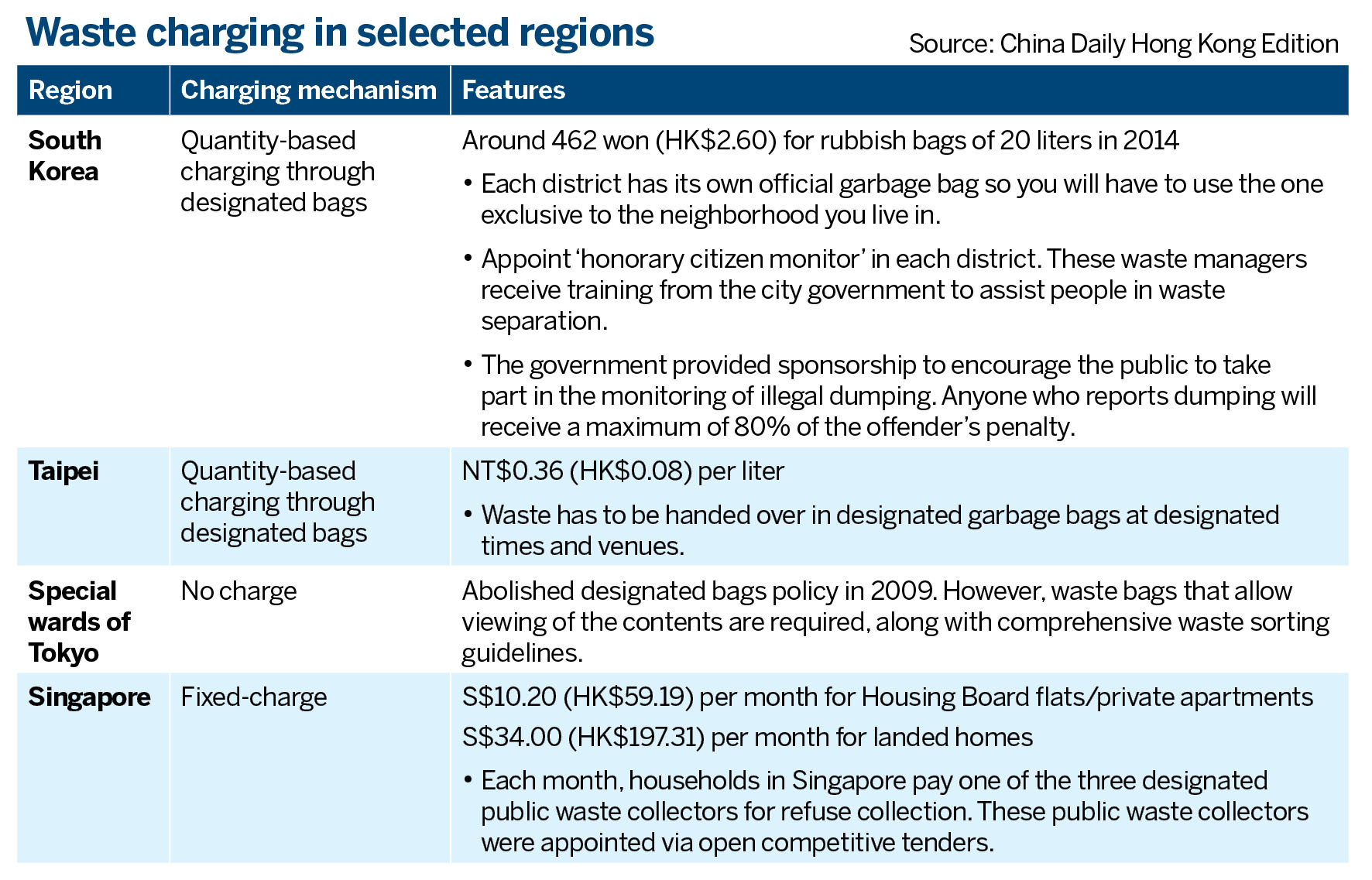
More sorting facilities
Concerns over the city’s waste sorting and collection capacities need to be tackled. Siu said the government should take proactive measures to increase the total number of bins and containers available, to separate different categories of waste.
“These additional bins should be spread out across different districts based on their respective population densities,” he said. A strategic distribution approach would involve assessing each district’s population density, demographic characteristics, and waste generation patterns. Also, additional containers should be provided for recyclables such as glass and metal, ensuring that these materials are properly sorted for recycling.
Food waste constitutes the largest MSW component in Hong Kong. The government has already launched food waste collection programs by adopting smart recycling bins for both public and private residential buildings. Secretary for Environment and Ecology Tse Chin-wan said in June that about 700 smart recycling bins for food waste were installed at 90 percent of public estates.
Nonetheless, the participation rate for private residential buildings is below the public ones, with only 15 applications approved under a solicitation program, Siu said. Although the costs for private residential buildings of adopting such bins are subsidized through the Recycling Fund, the applicant must provide evidence of support by at least 200 participating households.
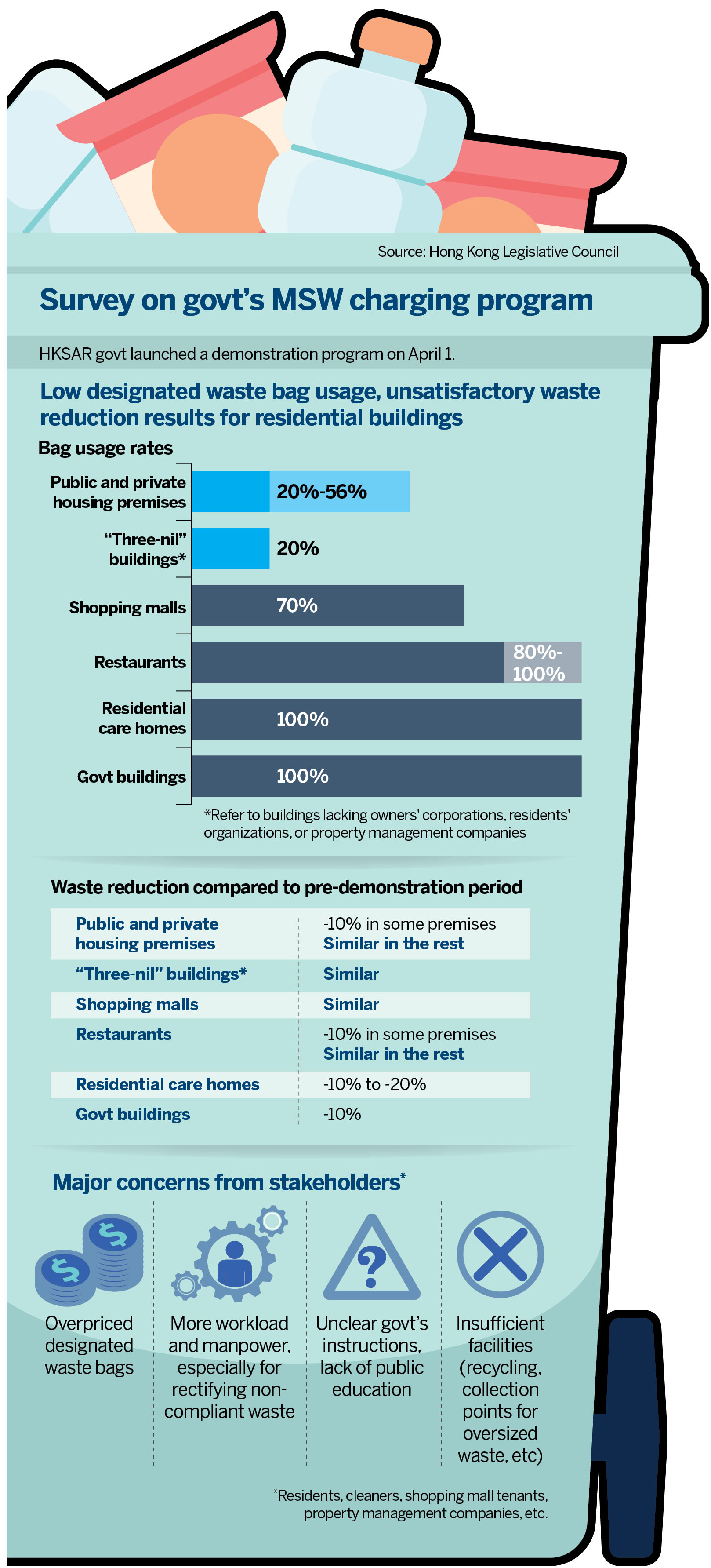
To encourage more buildings to participate, the government can consider granting subsidies without upfront specific household requirements, Siu said. Instead, the residents’ organizations or property management companies can monitor usage after the installation of the smart bins. If the participation rate is below the expected threshold, the applicant should be required to return a portion of the subsidy to the government. That can be a self-correcting mechanism.
Besides, the authority could establish a percentage criterion, instead of mandating a fixed number of supporting households, Siu said. The applicant could be required to achieve the support of, say, 30 to 40 percent of the households within the residential building. This approach would be fairer to residential buildings with fewer units.
Hong Kong lawmaker Zhang suggested exemptions to targeted groups of people at the early stage of implementation, to minimize resistance. The exemption could involve distributing a reasonable quantity of designated bags — say, 25 per month — to households free of charge. Only a small number of individuals who generate excessive waste requiring more bags will be charged.
“We can gradually reduce the number of free disposal bags once people become familiar with rules to run the program smoothly — and finally raise the overall recycling rate in our society,” the legislator said.
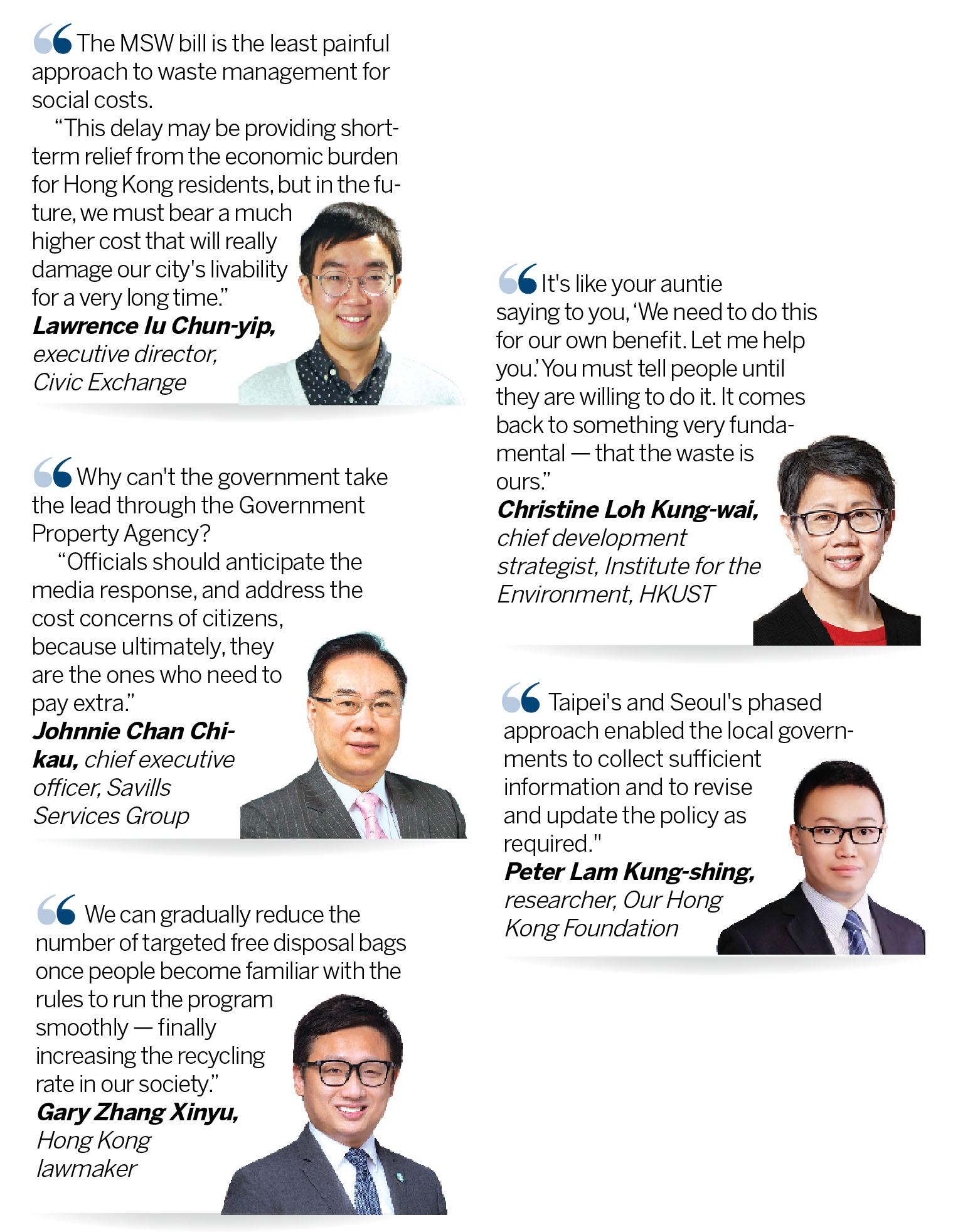
Whole govt approach
Wu Ka-ming, associate professor in the department of cultural and religious studies at the Chinese University of Hong Kong, said more extensive engagement with the private sector is needed for the government to revive the plan. The tools for the government are incentives and subsidies, Wu said. This could include tax breaks or other financial incentives for businesses that adopt more-sustainable waste management practices.
Iu from the Civic Exchange said the government should use the “whole government” approach to push this bill again as he noticed that only the Environment and Ecology Bureau led the program. The Tourism Board could mobilize support from the city’s hotel industry on how to implement the bill effectively, he said, adding that coordinated efforts within the government bodies will help to amplify the message.
ALSO READ: HK mulls collaborative waste management with other GBA cities
As a policy that affects the whole society, waste charging will never satisfy every stakeholder. But it is essential to take the first step and perfect it later, said Alicia Shen, an intern at the HKUST Institute for the Environment, doing environmental research. “You have to at least try it and figure out the problems, instead of delaying it,” she said.
Theresa Wu King-yan, assistant director of the Environmental Protection Department, unintentionally triggered a social media meme when she said that residents could trim awkward disposables using a saw, to fit the disposal bags. The meme allied the saw to the trash bags, as an indispensable tool for residents.
What's next
- Gain public cooperation with whole government approach
- Ensure adequate sorting and collection facilities
- Offer exemptions to targeted groups in the initial stage
- Implement charging program first at government buildings
- Fine-tune business sector waste handling incentives
Contact the writer at evanliu@chinadailyhk.com


